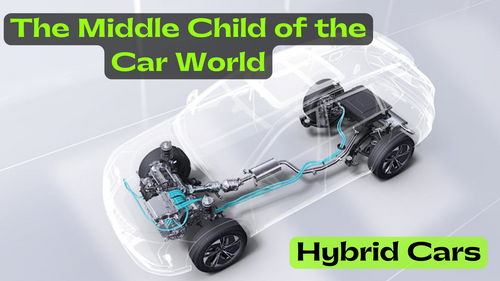Hybrid Cars Unveiled: The Middle Child of the Car World

4896 Views
Hybrid cars: the eco-friendly choice that combines fuel efficiency and lower emissions with the convenience of traditional and electric vehicles. Learn how hybrids work and why they are good for the planet.

Now that the whole world is bending towards electric vehicles, it’s crushing every ‘petrolhead’ troop’s dream. Even the Government has a vision to convert every car on the road into electric ones by 2030.
So, how to decide between your love of fuel engines and the efficient & eco-friendly electric vehicles?
Here is where the Hybrid cars take place. Exactly in the middle. Where you can still enjoy the thrust of an combustion engine, and enjoy the benefits of an electric motor’s efficiency.
Hybrid cars are a combination of an internal combustion engine (ICE) and an electric motor to provide propulsion. They are designed to optimize fuel efficiency and reduce emissions compared to conventional petrol or diesel-powered vehicles.
Here is a more detailed overview of hybrid cars, including their types, benefits, challenges, and current research in the field:
1. Types of Hybrid Cars:

a. Full Hybrid (Parallel Hybrid): Full hybrids can operate on the electric motor alone, the petrol engine alone, or a combination of both. They have a sophisticated powertrain that allows seamless switching between the two power sources. Full hybrids utilize regenerative braking to recharge the battery and can achieve significant fuel savings in stop-and-go traffic.
b. Mild Hybrid: Mild hybrids incorporate a small electric motor to assist the fuel engine. The electric motor cannot solely propel the vehicle; instead, it provides power assistance to the engine during acceleration, reducing the load on the engine and improving overall fuel efficiency. Mild hybrids are more focused on optimizing fuel economy rather than providing significant electric-only driving capabilities.
c. Plug-in Hybrid Electric Vehicle (PHEV): PHEVs have larger battery packs compared to full or mild hybrids, allowing them to be charged from an external power source, such as a wall socket. This enables extended all-electric driving ranges before the fuel engine is required. PHEVs offer the flexibility of driving in electric-only mode for shorter trips while still having the option of using the petrol engine for longer journeys.
d. Series Hybrid (Range Extender Hybrid): In series hybrids, the petrol engine acts as a generator to charge the batteries, which in turn power the electric motor that propels the vehicle. The petrol engine does not directly drive the wheels. Series hybrids provide the advantage of having the petrol engine operate at its most efficient speed, resulting in improved fuel economy.
2. Benefits of Hybrid Cars:
a. Fuel Efficiency: Hybrid cars combine the power of an electric motor and an internal combustion engine, allowing for optimized fuel efficiency. The electric motor assists during acceleration, reducing the load on the engine and enabling it to operate more efficiently. Regenerative braking also captures energy that would otherwise be wasted in conventional vehicles.
b. Environmental Impact: They produce lower emissions compared to traditional vehicles. The electric motor reduces or eliminates tailpipe emissions, resulting in reduced greenhouse gas emissions and improved air quality. Furthermore, regenerative braking allows for the recapture of energy that would be lost in traditional braking systems.
c. Reduced Dependence on Fossil Fuels: By utilizing electric power, hybrid cars decrease dependence on fossil fuels and contribute to the diversification of energy sources used in transportation. This reduces reliance on non-renewable resources and helps address concerns about energy security.
d. Potential Cost Savings: Although hybrid cars may have a higher upfront cost compared to conventional vehicles, they can offer long-term cost savings through lower fuel consumption. Additionally, maintenance costs can be reduced due to the regenerative braking system's lower wear and tear on brake components.
e. Enhanced Driving Experience: Hybrid cars often provide a smoother and quieter ride compared to conventional vehicles. The electric motor's instant torque delivery enhances acceleration, while the reduced noise from the petrol engine improves overall comfort.
3. Challenges and Considerations:
a. Cost: Hybrid cars typically have a higher initial cost compared to conventional vehicles due to the additional technology and components required. However, as technology advances and production scales up, the cost of hybrid vehicles is gradually decreasing.
b. Limited Electric Range: Non-plug-in hybrid cars rely on regenerative braking and the petrol engine to charge their batteries, which limits their electric-only range. Plug-in hybrids offer a longer electric range, but for longer trips, they still rely on the petrol engine. However, the continuous development of battery technology is extending the electric range of hybrid vehicles.
c. Battery Life and Replacement: Hybrid cars use complex battery systems to store and deliver electrical energy. While the lifespan of these batteries is typically long, eventually, they will need to be replaced, which can be a significant cost. However, ongoing research aims to improve battery durability and reduce replacement costs.
d. Charging Infrastructure: Plug-in hybrid owners require access to charging infrastructure for optimal electric driving. The availability and accessibility of charging stations can vary depending on the region. However, the expansion of public and private charging networks is addressing this challenge.
e. Weight and Performance: The additional components, such as the electric motor and batteries, can add weight to the vehicle, potentially affecting performance and handling compared to conventional cars. However, many automotive manufacturers are continually working on innovative designs and materials to minimize weight and improve overall performance.
In a nutshell, hybrid cars bring a bunch of cool perks to the table. They give you better fuel efficiency, lower emissions, and a smoother ride. And guess what? Researchers are actively working to make them even better! They're focused on improving battery technology, so you get more power and range from the electric side. Plus, they want to bring down the costs and make hybrid cars perform like champs. It's all part of the grand plan to make transportation more sustainable.
Hybrids are like the middle ground between traditional cars and fully electric ones. They're paving the way for a greener future on the roads.